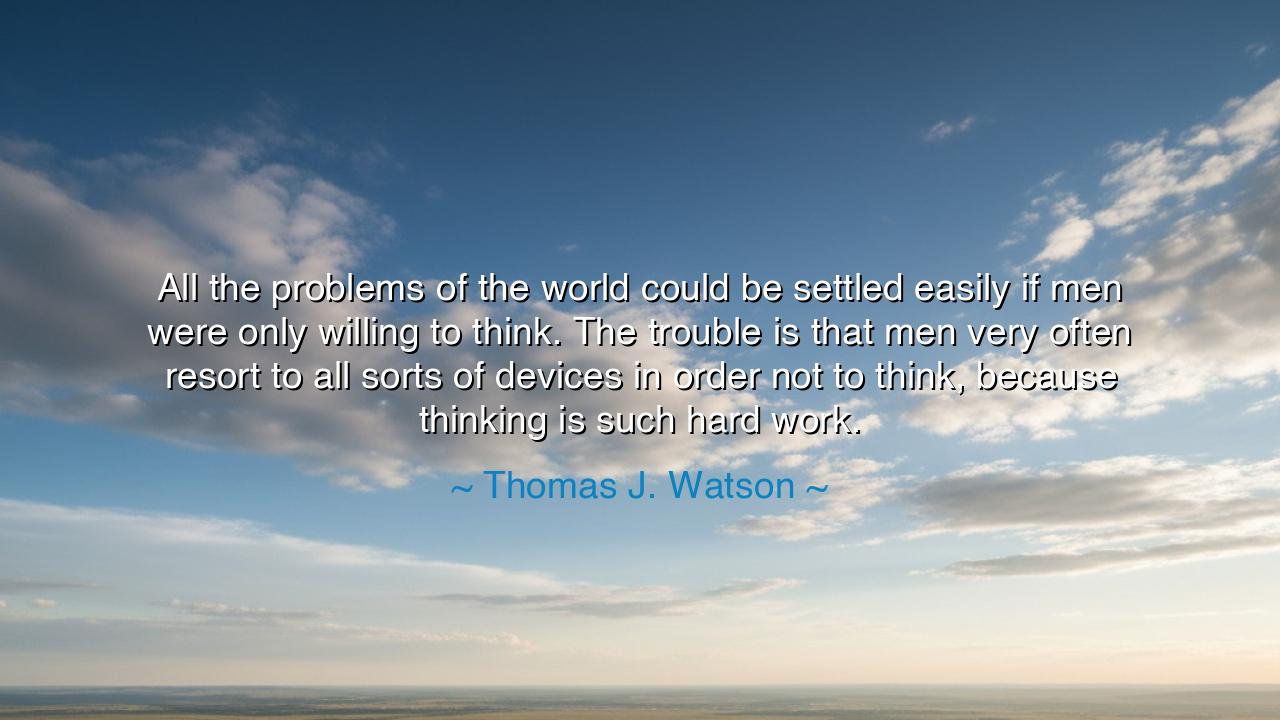
All the problems of the world could be settled easily if men were
All the problems of the world could be settled easily if men were only willing to think. The trouble is that men very often resort to all sorts of devices in order not to think, because thinking is such hard work.






Thomas J. Watson, the great pioneer of business and industry, once uttered words that resound beyond the halls of commerce and into the chambers of the human spirit: “All the problems of the world could be settled easily if men were only willing to think. The trouble is that men very often resort to all sorts of devices in order not to think, because thinking is such hard work.” These words cut to the heart of our age and every age, for they reveal that the true scarcity in the world is not resources, nor tools, nor even goodwill—but the courage to engage in the labor of the mind.
The meaning of his words is sharp and enduring. To think is to pierce through illusion, to weigh truth against falsehood, to search for causes rather than symptoms. Yet this effort is heavy, and men, weary of the burden, turn instead to distraction, to habit, to dogma, and to noise. They prefer the ease of reaction over the discipline of reflection, the comfort of routine over the strain of inquiry. Thus, the world drowns not because there are no solutions, but because too few are willing to lift the anchor of thought.
Consider the ancient Athenians, who once prided themselves on philosophy and debate. Socrates walked among them, asking questions that cut deeper than swords. Yet many despised him, for he forced them to think, and thinking disturbed the slumber of custom. They accused him of corrupting the youth and condemned him to death. Athens chose the easier path—silencing the questioner instead of confronting the questions. And in so doing, they revealed the very weakness Watson named: the fear of true thought.
History offers another example in the tragedies of war. How many conflicts might have been avoided had leaders stopped to think beyond pride, beyond vengeance, beyond short-term gain? The First World War erupted not because wisdom demanded it, but because rashness and haste prevailed. A handful of men, unwilling to reason through consequences, unleashed devastation upon millions. The cost of refusing the labor of the mind was blood, ash, and ruin. Truly, the failure to think is the most expensive failure of all.
And yet, where thinking has been embraced, light has broken through darkness. Abraham Lincoln, in the midst of civil war, spent long hours in contemplation, weighing each decision with care. His thinking did not make his path easy, but it gave his actions depth and steadiness. Likewise, the great scientists—Galileo, Newton, Einstein—did not flinch from the hard work of the mind. They bore the strain of thought, and in return they unveiled truths that reshaped the very fabric of the world.
The lesson for us is as clear as the midday sun: if you would see the problems of your life, your community, or your world resolved, do not first seek weapons, or wealth, or power—seek the discipline to think. Do not flee into distraction when difficulty arises. Instead, sit with the problem, wrestle with it, ask it questions, and bear the weight of uncertainty until clarity comes. For while thinking is toil, it is also liberation, the key that unlocks the chains of confusion.
Practical action follows: each day, set aside time to think deliberately. Not merely to worry, nor to react, but to reflect with purpose. Ask yourself: what is truly happening, what is truly needed, what lies beneath the surface of appearances? Do not be content with easy answers. Train your mind as one trains the body—with discipline, with patience, with endurance. Over time, you will find that solutions which seemed impossible become visible, for the mind, like a lamp, shines brighter the more it is tended.
So let Watson’s words endure as a challenge: “All the problems of the world could be settled easily if men were only willing to think.” Do not be among those who hide from the labor of thought. Be among the few who take it up, who refuse distraction, who embrace the hard work of the mind. For in the end, the world is not changed by those who shout the loudest, but by those who dare to think the deepest. And such men and women, though few, are the true architects of the future.






AAdministratorAdministrator
Welcome, honored guests. Please leave a comment, we will respond soon